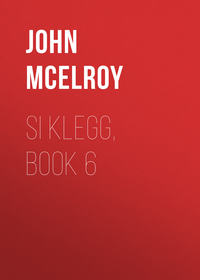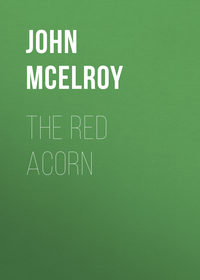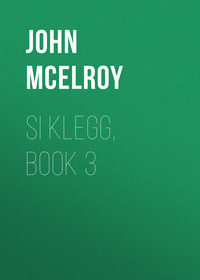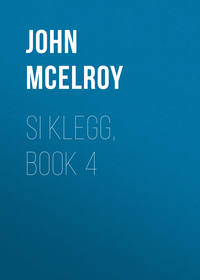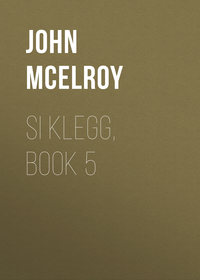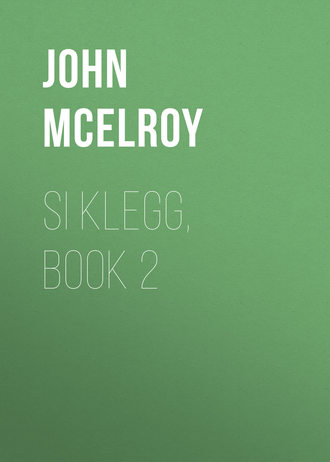 полная версия
полная версияSi Klegg, Book 2
"Steady, men, I tell you! Steady! Press on the center," commanded the unseen Colonel. "Forward! Forward!"
In spite of his perturbation, Si noticed that the sounds did not seem to be coming any nearer.
"We must get a squint at 'em," he said, desperately, to Shorty. "Let's git down an' crawl forward. There must be an openin' somewhere."
They got down on their hands and knees, so as to avoid as many as possible of the thickly-interlaced branches. Soon they came to a rift which led to an opening of some rods in circumference. Raising their heads cautiously above a moss-covered log, they saw in the opening a stalwart Sergeant with five or six men. The Sergeant was standing there with his eyes fixed on the tops of the trees, apparently thinking of the next series of commands he was to give, while the men were busy breaking limbs off the cedars.
Si and Shorty immediately grasped the situation.
"Forward, Co. Q!" yelled Si at the top of his lungs. "Surrender, you consarned rebels, or we'll blow your heads off," he added, as he and Shorty jumped forward into the opening and leveled their guns on the squad.
"What'n thunder was you fellers makin' all that racket fur," Si asked the Sergeant as he was marching him back to the skirmish-line.
"Ouah Cunnel," explained the Sergeant, "wuz afeared you'ns 'd try to flank us through the thicket, and sent me down to make a rumpus and hold you back while he fit you in front. But whar's your company?"
"We'll come to it soon," said Si.
CHAPTER III. STILL ON THE MARCH
SI AND SHORTY STOP ON THE WAY LONG ENOUGH TO BAG SIX REBSSI CALLED out to the other boys by name to come up and join him.
The rebel Sergeant mentally tallied off each name as it was called. A flush of shame and anger mounted to his face as Si concluded.
"Gol darn hit," he said, "you'uns hain't got ez many ez we'uns; they hain't nigh ez good men ez we'uns, an' they'uns ain't heah. We'uns air Tennesseans, an' you'uns hain't."
"We've got enough, an' they're good enough," said Si sententiously. "Injianny turns out better men than Tennessee ever dreamed o' doing."
"I don't believe hit a mite," said the Sergeant, stooping down and picking up a piece of cedar, which made a formidable club. "We'uns is not a-gwine back with yo'uns nary a step. By rights, we'uns orter take yo'uns back with we'uns. But I'm willin' to call hit off, and let yo'uns go ef yo'uns 'll let we'uns go. Is hit a bargain?"
"Not by 40 rows o' apple trees it ain't," said Si, stepping back a little to get a better range, and fixing his bayonet. "I've set my heart on takin' you back to Co. Q, an' back to Co. Q you'll go, if Si Klegg knows himself."
"And you'll go in a hurry, too," said Shorty. "It's gettin' late, and I'm always afraid to be out after dark. Mosey, now!"
The other rebels were picking up clubs similar to the Sergeant's and casting their eyes on him for the signal to attack.
"See here," said Si desperately, cocking his gun. "Don't waste no more time in words. This hain't a debatin' society. You're goin' back to Co. Q or going somewhere else thunderin' quick. Sergeant, if you make a move agin me I'll surely blow your head off en you, an' jab my bayonet through the next man. My partner, Shorty, is a worse man than I am, an' I can't tell how many of you he'll kill. He's awful quick-tempered, too, towards evening, an' liable to begin shooting any minute without warnin'. It'll save several lives if you start right off on the jump, straight toward the rear, an' keep it up, with out looking to the right or left, until you reach Co. Q. You'll find the trail we made comin' in. Take it this minute."
The rebel Sergeant's eyes looked directly into the dark muzzle of Si's gun. They glanced along the barrel, and met one eye looking directly through the sights, while the other was closed, in the act of taking deliberate aim. He decided with great promptness that there were many reasons why he should prefer to be a live rebel in a Yankee prison, rather than a badly-disfigured dead one in a lonely cedar thicket. He dropped his club, turned around, and made his way along the path over which Si had come. The rest followed, with Si and Shorty a few paces in the rear.
Palpitating with pride, Si marched his prisoners up to the company, who gave him three cheers. The Captain ordered him to report with his prisoners to the Colonel.
The Colonel praised him with words that made his blood tingle.
The skirmishing off to the right had now ceased. The rebels had fallen back to the next hilltop, and the 200th Ind. was ordered to go into camp where it stood.
It was a fine place for a camp. The mud of the day before was frozen into stony hardness. The wagons had no difficulty in coming up. There was wood and water in abundance, and it seemed that the command "Break ranks March!" had hardly been uttered when great, bright, comfort-giving fires of fragrant cedar rails flashed up all along the line.
Si and Shorty found several cedar stumps and logs, which they rolled together, and made a splendid fire. They cooked themselves an ample supper of fried pork, toasted hardtack, and strong, fragrant coffee, which they devoured with an appetite and a keen enjoyment only possible to healthy young men who have had a day of active manuvering and marching in the crisp, chill air of December.
Then they gathered a lot of cedar branches, and made a thick mattress of them near the fire, upon which to spread their blankets for the night.
This was a new suggestion by Shorty, and an amazing success.
"I declare, Shorty," said Si, as he lay down on the bed to try it, "I often wonder where you get all your ideas. For a man who wasn't raised on the Wabash you know an awful sight. Mebbe, if you'd actually been born in Posey County you'd a-knowed enough to be a Jigadier-Brindle. Then I'd a lost you for a pard. This's a great invention. Why, it's softer and comfortabler than one of mother's feather beds. When I get out of the army, I'm going to sleep on nothin' but cedar boughs."
"There, you're at it again the Wabash forever," returned Shorty, good-humoredly. "They raise the finest corn and cattle in the world on the Wabash, I'll admit, and some fairly good soldiers. But where'll you get any cedars there to make beds with? You'll have to go back to sleepin' on wheat straw and corn husks, with chicken-feather pillers. But after the way you stood up to that rebel Sergeant to-day I'll never say another word about ager and milk-sick en the Wabash, and I'll lick any other feller that does. There wasn't a speck of ager in your gizzard when you ordered him forward, or you'd blow his Southern Confederacy head off."
"There was more ager there than you thought, Shorty," Si admitted softly. "I was awfully scared, for there was six to us two, and if that feller 'd had the right kind of sand he'd a-jumped me at once, before I could get my gun up. The moment he began to palaver I knowed I had him. But I'd 'a' died in my tracks before I'd let him go, and I knowed you would, too. You're the best pard a feller ever had."
And he reached over and took Shorty's rough hand and squeezed it affectionately.
"I can bet on you every time, even when I don't think it's quite safe to bet on myself. And, Shorty," he continued, with his eyes kindling, "it was worth all that we've gone through since we've been in the army, even all that time in the rain, to have the Colonel speak as he did to us before the rest of the boys. I'd be willing to enlist three years more if father and mother and sisters, and and Annabel could have heard him. I tell you, war has some glorious things in it, after all."
He sat there on his bed before the fire, with his feet curled up under him in the comfortable way that it takes months of field service to acquire, and gazed steadily into the bank of glowing coals. They suffused his face and body with their generous warmth, and helped lift his soul toward the skies.
He was much happier than he had ever been before in his life. The trials of the day before were hardly more than a far-away dream. The fears and anxieties of the coming battle were forgotten. The ruddy embers became a radiant vista, which Pride and Hope and Joy filled with all that he wanted to see. He saw there the dear old home on the Wabash, his father seated by the evening lamp reading the paper, while his mother knit on the other side of the table. His sisters were busy with some feminine trifles, and Annabel had come in to learn the news. They would hear what he had done, and of the Colonel's words of praise before the regiment, and his father's heart would glow with pride and his mother's eyes suffuse with tears. And Annabel but it passed words, passed thought, almost, what she would say and think.
Just then tattoo rang out clear and musical on the chill night air. The rattling military "good night" had never before had any special charms for Si. But now he thought it an unusually sweet composition.
"I declare," he said to Shorty, "that sheepskin band of our'n is improving. They're getting to play real well. But I ought to write a few lines home before taps. Got any paper. Shorty?"
"Much paper you'll find in this regiment after that rain," said Shorty contemptuously, as he knocked the ashes out of his pipe, and started to fall in for roll-call. "Every mite of paper anybody has was soaked to spitwads. But mebbe the Orderly might have a sheet."
After roll-call Si went to the Orderly-Sergeant.
Nothing in reason could then be refused Si, and the Orderly tore a couple of leaves out of the back of his treasured diary, which had escaped the rain, and handed them to him. Si fished his stub of a pencil out of his blouse-pocket, laid the paper on the back of a tin plate, and began:
"Somewhere in Tennessee,
December the 27th, 1862.
"Dere Annabel: We're movin' on Murphysboro, where we expect a big fite. There's bin fitin' goin' on ever since we left Nashville, but the 200th Ind. hain't had no hand in it so far, except this after noon me and Shorty"
He stopped, stuck his pencil in his mouth, and began to study just what words he should use to describe the occurrence. He wanted to tell her all that was bubbling in his heart, and yet he was afraid she would think him an intolerable boaster, if he told it in just the words that came to him. He was more afraid of that little country girl's disapproval than of all the rebels in Murfreesboro.
There were yells, the rattling of chains, and the sound of galloping hoofs coming toward him.
"Hi, there; stop them condemned mules!" shouted the voice of a teamster.
Si jumped to his feet, for the mules were charging directly for his fire, and were almost upon him. He dropped paper, pan and pencil, and jumped to one side, just in time to avoid a rush which scattered his fire, his carefully-prepared bed, and all his be longings under 24 flying, hard-pounding hoofs.
"Blast mules, anyhow," said the driver, coming up with his whip in his hand. "I didn't hev nothin' for them to eat but a cottonwood pole that I cut down in the bottom. But they must have smelt fodder over there somewhere, and they broke for it like the devil beatin' tanbark. Hope you weren't hurt, pard."
Si and Shorty fixed up their fire again, rearranged their scattered cedar boughs, and did the best they could with their torn blankets.
Si found that a mule's hoof had landed squarely on his tin plate, mashed all future usefulness out of it, and stamped his letter to Annabel into unrecognizability.
He threw the rent fragments into the fire, sighed deeply, and crawled under the blankets with Shorty, just as three sounding taps on the bass-drum commanded silence and lights out in the camp.
CHAPTER IV. THE SUNSHINE OF LIFE
SI FEELS ONCE MORE THAT LIFE IS REALLY WORTH LIVINGTHERE come times in every man's life when he feels himself part of the sunshine that illumines and warms the earth:
The lover, after he has won his best girl's consent.
The candidate, after he has been elected by a big majority.
The valedictorian, after his address has been received with bursts of ringing applause.
The clerk, after he has been admitted into partnership.
The next morning the camp of the 200th Ind. seemed to Si Klegg one of the most delightful places on earth.
The sun shone brightly and cheerily through the crisp December air. The fires of cedar rails sent up a pungent, grateful fragrance. Hardtack, pork and coffee tasted better than he had ever known them.
Everybody noticed him and spoke pleasantly to him. The other boys of Co. Q called out cheerily to him from their fires. Those from other companies would stroll over to take a look at him and Shorty, and his comrades would point them out proudly as fair specimens of Co. Q, and what it was capable of doing when called upon in an emergency.
The Captain spoke very cordially to him and Shorty, the busy Adjutant stopped and greeted them smilingly, and even the grave Colonel singled them out for a pleasant "Good morning" and an inquiry as to whether they had everything they wanted. It did not seem to Si that there was anything more on earth just then for which he could ask.
The 200th Ind. having been at the head of the column when it halted, was to take the rear for that day's march, and so remained in camp for a while to let the rest pass on.
After getting things ready for the march Si and Shorty took a stroll through the camp to see what was to be seen. They came across their prisoners seated around a fire, under guard.
How different they looked from what they did the evening before, when the two partners encountered them in the depths of the cedar brake. Then they seemed like fierce giants, capable of terrible things, such as would make the heart quail. Now, powerless of harm, and awed by the presence of multitudes of armed men in blue filling the country in every direction that they looked, they appeared very commonplace, ignorant, rough men, long-haired, staring-eyed, and poorly-clad in coarse, butternut-dyed homespun, frayed and tattered.
"Father gits better men than them to work on the farm for $8 a month," Si remarked to Shorty, after a lengthened survey of them.
"Eight dollars a month is Congressman's wages to what they git for fightin' for the Southern Confederacy," answered Shorty. "I don't s'pose any one of 'em ever had eight real dollars in his pocket in his life. They say they're fightin' to keep us from takin' their niggers away from 'em, and yit if niggers wuz sellin' for $1 a-piece not one of 'em could buy a six-months'-old baby. Let's go up and talk to 'em."
"I don't know 'bout that," said Si, doubtfully. "Seems to me I wouldn't be particularly anxious to see men who'd taken me prisoner and talked very cross about blowin' my blamed head off."
"O, that's all right," answered Shorty confidently. "Words spoken in the heat of debate, and so on. They won't lay them up agin us. If they do, and want any satisfaction, we can give it to 'em. I kin lick any man in that crowd with my fists, and so kin you. We'll jest invite 'em to a little argyment with nature's weepons, without no interference by the guard. Come on."
The prisoners returned their greetings rather pleasantly. They were so dazed by the host of strange faces that Si and Shorty seemed, in a measure, like old acquaintances.
"Had plenty to eat, boys," asked Shorty, familiarly, seating himself on a log beside them and passing his pipe and tobacco to the Sergeant.
"Plenty, thankee," said the Sergeant, taking the pipe and filling it. "More'n we'uns 've had sence we left home, an' mouty good vittles, too. You Yanks sartinly live well, ef yo'uns don't do nothin' else."
"Yes," said Shorty, with a glance at his mud-stained garments, "we're bound to live high and dress well, even if we don't lay up a cent."
"You sartinly do have good cloze, too," said the Sergeant, surveying the stout blue uniforms with admiration. "Yo'uns' common soldiers 've better cloze than our officers. We'uns got hold o' some o' yo'uns' overcoats, and they wear like leather."
"There's leather in 'em," said Shorty unblushingly. "I tell you, old Abe Lincoln's a very smart man. He saw that this war was costin' a heap of money, especially for clothes. He got a bright idee that by soaking the clothes when they were new and green in the tan-vats, jest after the leather wuz taken out, they'd take up the strength o' the leather out o' the juice, and wear always. The idee worked bully, and now old Abe goes every morning to where they're makin' clothes and sees that every stitch is put to soak."
"Nobody but a Yankee'd thought o' that," said the rebel reflectively.
"You bet," assented Shorty. "Jeff Davis'd never think of it if he lived to be as old as Methuselah. But that's only the beginnin' of Abe Lincoln's smartness."
"He's a durned sight smarter man than we'uns thought he wuz when we begun the war," admitted the Sergeant. "But we'uns 'll wollop him yit, in spite of his smartness."
"We kin tell more about that a few months later," returned Shorty. "It's never safe to count the game until the last hand's played. We hain't fairly begun to lead trumps yit. But what are you fellers fighting for, anyhow?"
"We'uns foutin' for our liberty, and t' keep yo'uns from takin' our niggers away."
The reply that came to Shorty's lips was that they seemed to be losing a great deal of liberty rather than gaining it, but he checked this by the fear that it would be construed as an ungentlemanly boast of their capture. He said, instead:
"I never knowed as any of us wanted your niggers—me particularly. I wouldn't take a wagon load of 'em, even if the freight was prepaid. But, let me ask you, Sergeant, how many niggers do you own?"
"I don't own nary one."
"Does your father own any?"
"No, he don't."
"Does your mother, or brothers, uncles, aunts, or cousins own any?" persisted Shorty.
"No, thar ain't nary one owned in the hull family."
"Seems to me," said Shorty, "you're doin' a great deal of fightin' to keep us from takin' away from you something that we don't want and you hain't got. That's the way it looks to a man from north o' the Ohio River. Mebbe there's something in the Tennessee air that makes him see differently. I'll admit that I've changed my mind about a good many things since we crossed the river."
"I've alluz said," spoke another of the prisoners, "that this wuz a rich man's wah and a pore man's fout."
"Well," said Shorty, philosophically, "for folks that like that sort o' fightin,' that's the sort o' fightin' they like. I'm different. I don't. When I fight it's for something that I've got an interest in."
While the discussion was going on Si had been studying the appearance of the prisoners. In spite of their being enemies his heart was touched by their comfortless condition. Not one of them had an overcoat or blanket. The Sergeant and a couple of others had over their shoulders pieces of the State House carpet, which had been cut up into lengths and sewed together for blankets. Another had what had once been a gaudy calico counterpane, with the pat tern "Rose of Sharon" wrought out in flaming colors. It was now a sadly-bedraggled substitute for a blanket. The others had webs of jeans sewed to gether.
The buttons were gone from their garments in many essential places, and replaced by strings, nails, skewers and thorns. Worst of all, almost every one of them was nearly shoeless. A sudden impulse seized Si.
"Shorty," said he, "these men are going up where the weather is very cold. I wish I was able to give each of them a warm suit of clothes and a blanket. I ain't though. But I tell you what I will do; I'll go down to the Quartermaster and see if he'll issue me a pair of shoes for each of 'em, and charge it to my clothin' account."
"Bully idee," ejaculated Shorty. "I'll go you halves. Mebbe if they git their understandin' into Yankee leather it'll help git some Yankee idees into their understandin'. See?"
And Shorty was so delighted with his little joke that he laughed over it all the way to the Quarter master's wagon, and then rehearsed it for that officer's entertainment.
Fortunately, the Quartermaster had a box of shoes that he could get at without much trouble, and he was in sufficiently good humor to grant Si's request.
They added a warm pair of socks to each pair of shoes, and so wrought up the A. Q. M.'s sympathies that he threw in some damaged overcoats, and other articles, which he said he could report "lost in action."
They came back loaded with stuff, which they dumped down on the ground before the prisoners, with the brief remark:
"Them's, all yours. Put 'em on."
The prisoners were overwhelmed by this generosity on the part of their foes and captors.
"I alluz thought," said the Sergeant, "that you Yankees wuz not half so bad ez I believed that yo'uns wuz. Yo'uns is white men, if yo'uns do want to take away our niggers."
"Gosh," said the man who had uttered the opinion that it was a rich man's war and a poor man's fight, "I'd give all my interest in every nigger in Tennessee for that ere one pa'r o' shoes. They're beauties, I tell you. I never had so good a pa'r afore in all my life."
CHAPTER V. LINING UP FOR BATTLE
THE 200TH IND. GUARDS THE WAGON TRAIN, AND DEFEATS AN ATTACK"RAIN agin to-day," said Shorty, disgustedly, as, on the morning of Dec. 30, 1862, he crawled out of the shelter which he and Si had constructed by laying a pole in the crotches of two young cedars, and stretching their ponchos and pup-tents over it. "Doggoned if I don't believe Tennessee was left out in the flood, and they've been tryin' to make up for it ever since. I'd rather have the flood at once, and be done with it, for then I'd join the navy instead of paddlin' 'round in this dirty glue that they call mud." "Never saw such a grumbler, Shorty," said Si cheerily, as he punched the soaked embers together to start a blaze to boil their coffee by. "Last Summer the dust and dry weather didn't suit you. Do you want to do your soldierin' in heaven?"
"Hurry up with your grub, boys," said the Orderly-Sergeant, who came spattering through the muck of leaves and mud into which the camping-ground had been trampled. "The regiment's to move in 15 minutes. The 200th Ind. guards wagon-trains to-day. Yesterday Wheeler's cavalry got in among our wagons and raised thunder—burnt about a mile of 'em."
Shorty grumbled: "That means a tough day's work pryin' wagons out of the mud, and restin' ourselves between times runnin' after a lot o' skippin', cavortin' cavalry that's about as easy to ketch as a half-bushel o' fleas. Anything I hate it's rebel cavalry all tear-around and yell, and when you git ready to shoot they're on the other side o' the hill."
"Well," said Si, removing a slab of sizzling fat pork from the end of his rammer, laying it on his hardtack, and taking a generous bite, "we mustn't allow them to take no wagons away from the 200th Ind., slosh around as they may. We want all that grub ourselves."
"Well, hump yourselves," said the Orderly-Sergeant, as he spattered on; "fall in promptly when assembly blows. Got plenty o' cartridges?"
Two or three hours later every man in the 200th Ind., wet to the skin, and with enough mud on him to be assessable as real estate, was in a temper to have sassed his gentle old grandmother and whipped his best friend. He believed that if there was any thing under heavens meaner than Tennessee weather it was an army mule; the teamsters had even less sense and more contrariness than the mules; the army wagon was a disheartening device of the devil, and Tennessee roads had been especially contrived by Jeff Davis to break the hearts of Union soldiers.
The rain came down with a steady pelt that drove right through to the body. The wagon wheels sank into every mud-hole and made it deeper. Prying out the leading ones seemed only to make it worse for the next. The discouraged mules would settle back in the breech ings, and not pull an ounce at the most critical moments. The drivers would become blundering idiots, driveling futile profanity. In spite of all the mud the striving, pushing, pulling, prying, lifting, shouting 200th Ind. gathered up on their hands and clothes, it increased momentarily in the road.
The train had strung out over a mile or more of rocky ledges and abysses of mire. Around each wagon was a squad who felt deeply injured by the certainty that their infernal luck had given them the heaviest wagon, the worst mules, and the most exasperating driver in the whole division.


